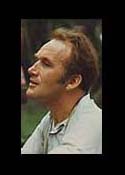 |
|
Home Press Release Author Excerpts Chronology Reviews Photos Order Contact Appearances Multimedia |
From Chapter Six, The Rain Forest
Patrick Putnam took an instant liking to Colin and tried to find a way for him to stay even longer. At the same time, the Hollywood producer Sam Spiegel was making the famous Katherine Hepburn and Humphrey Bogart film The African Queen. Spiegel had to ship the boat, The African Queen, and spare parts through the forest and needed considerable help with the transport. He also needed someone to build the center portion and boiler. Patrick made sure that Colin got the job.
www.africanqueen.net
From Chapter Seven, Magical Sounds According to Anne Eisner Putnam, Patrick
Putnam "went crazy in April of '53" after living in the Ituri
forest for more than two decades. He became self-destructive and threatened
all of his relationships. When he died late that year, ostensibly from
emphysema though privately many suspected syphilis, Anne must have
felt liberated as well as lonely. The European traders and plantation
owners living in the Ituri told stories of Patrick's erratic behavior:
that he had fashioned a throne for himself, insisting that his subjects
crawl before him, and that he had once demanded that a local villager
handle hot coals with his bare hands to show his respect for Putnam,
the king of the forest and a character out of Conrad.
"He was young, well but modestly dressed, and moderately black .
. light chocolate in color . . . with neat, short, crinkly hair . . .
Then I saw his eyes and those I do remember. They were open and clear
and utterly honest. For a moment I thought I was back in Africa."
From Chapter
Eight (1959-1963)
Photo of Joe Towles
Chapter Nine, The Museum
'Last Sunday night while engaged in performing the sacrament of baptism of Miss Dovie Bird, 263 Myrtle St., the Reverend Nicodemus Lovelace, 63, of the Fourth Baptist Chuch, 482 Lton Ave, slipped and disappeared into the Bapistry . . . Reliable sources attribute this last of a series of near-fatal accidents to the baleful influence of African Heathern [sic] idols.' . . . "No, I am not a superstitious man, Mr Turnbull, but one must admit that if the Lord can exert beneficent influences upon human affairs, it is only logical that the Devil can do the reverse."
Chapter Ten, The Edge of Humanity
"For two months this would be my prison, to which I would be driven, whenever I wanted to eat, by reproachful, sad brown eyes."
Chapter Eleven, Wild Correspondence
Within a year of the publication of The Mountain People, the major international journal of anthropology, Current Anthropology, published a series of critical assessments, with a lead article by the anthropologist, Fredrik Barth, entitled, "On Responsibility and Humanity: Calling a Colleague to Account." Barth wrote that The Mountain People deserves both to be sanctioned and to be held up as a "warning to us all." He said the book was "dishonest," "grossly irresponsible and harmful," threatening the "hygiene of the discipline."
Chapter Twelve, Rain
The man, sitting calmly before the crowd, confessed to having killed innocent people, but recognized that what he was really guilty of, and the reason he had to die, was violating the laws of the new Zairean nation. He thanked the crowd, got up, and moved toward the noose. Colin found that perspective almost convincing, despite his opposition to capital punishment.
Page 1 of Excerpts
Page 3 of Excerpts
